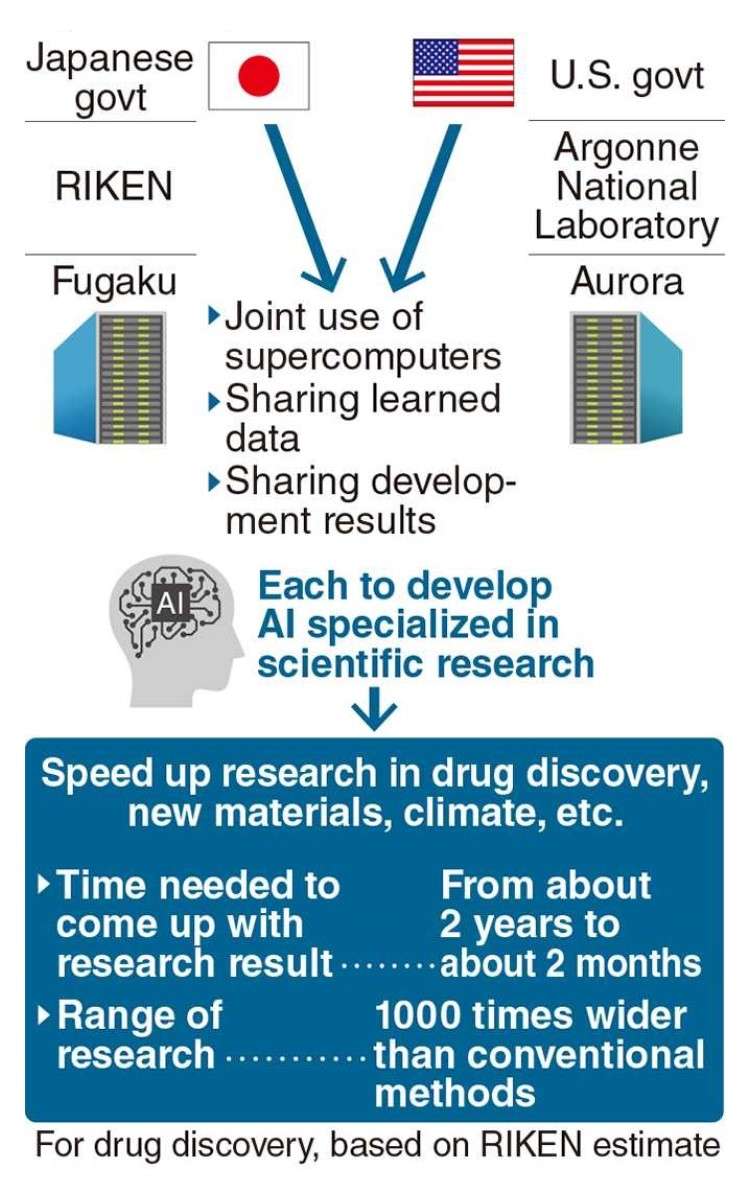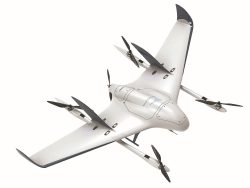Japan, U.S. to Collaborate on Developing AI Specialized for Scientific Research; Supercomputers Fugaku, Aurora to be Utilized

Japan. U.S. collaboration to speed up scientific research
2:00 JST, February 12, 2024
The Japanese and U.S. governments will collaborate on the development of artificial intelligence (AI) specialized for scientific research, it has been learned. The joint efforts will include data sharing for training AI and the joint use of supercomputers for AI development. The allied countries will work together in response to the anticipated intensified competition, accelerated by AI, for scientific discoveries among countries.
The Japan-U.S. collaboration is expected to be led through cooperation between the government-affiliated research institutes of RIKEN, which is under the jurisdiction of the Education, Culture, Sports, Science and Technology Ministry, and Argonne National Laboratory, which is under the U.S. Energy Department.
RIKEN and Argonne are home to two of the world’s top ranked high-performance supercomputers — Fugaku at RIKEN and Aurora at Argonne. As AI development requires a large amount of computation, both supercomputers will be utilized, and cooperation will be deepened in sharing data and results. The two sides aim to reach an agreement this spring.
The Japanese and U.S. governments have already separately begun to develop AI that is specialized for research by inputting data results from experiments and research papers. Japan plans to focus its development on the life and medical science field, such as drug discovery, as well as the materials field, such as new materials. The Japanese government also plans to make the developed AI available to companies and universities to strengthen Japan’s industrial competitiveness. The ministry has earmarked about ¥12 billion for development in the fiscal 2023 supplementary budget.
The United States has also announced that Argonne will develop large-scale AI for scientific research in such fields as climate, cancer and space. The development of high-performance AI requires high-quality data, therefore Japan and the U.S. sharing data and research results with each other could lead to the development of highly accurate AI.
AI allows for the analysis of large amounts of data in a short period of time. According to RIKEN’s estimates, if AI for scientific research is developed, it may be possible to reduce the amount of time for drug research from about two years to about two months, and to expand the range of research by 1,000 times wider than through conventional methods.
Some have argued that the use of AI in research has a significant impact on society due to the rapid increase in scientific discoveries and that the risks should be discussed as well. There are also concerns that AI may deprive researchers of their creativity. Therefore, the ministry will limit AI involvement in research to certain tasks, such as experiments.
Top Articles in Politics
-

Japan Seeks to Enhance Defense Capabilities in Pacific as 3 National Security Documents to Be Revised
-

Japan Tourism Agency Calls for Strengthening Measures Against Overtourism
-

Japan’s Prime Minister: 2-Year Tax Cut on Food Possible Without Issuing Bonds
-

Japan-South Korea Leaders Meeting Focuses on Rare Earth Supply Chains, Cooperation Toward Regional Stability
-

Japanese Government Plans New License System Specific to VTOL Drones; Hopes to Encourage Proliferation through Relaxed Operating Requirements
JN ACCESS RANKING
-

Univ. in Japan, Tokyo-Based Startup to Develop Satellite for Disaster Prevention Measures, Bears
-

JAL, ANA Cancel Flights During 3-day Holiday Weekend due to Blizzard
-

China Confirmed to Be Operating Drilling Vessel Near Japan-China Median Line
-

China Eyes Rare Earth Foothold in Malaysia to Maintain Dominance, Counter Japan, U.S.
-

Japan Institute to Use Domestic Commercial Optical Lattice Clock to Set Japan Standard Time
























